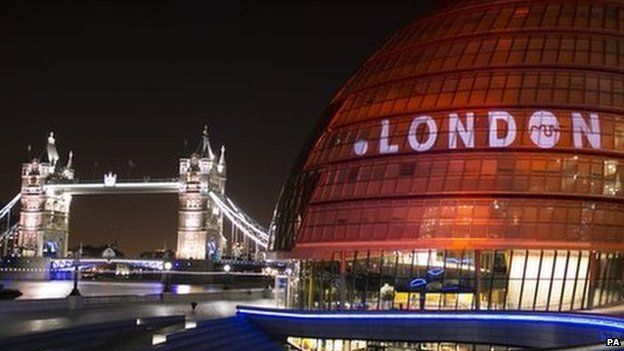New web domain names 'mean big business'
- Published

The Meantime Brewing Company thinks new domain names that can incorporate locations, such as London, are a capital idea.
It means the brewery, based in Greenwich, south-east London, can launch a new web address - meantimebrewing.london - which it thinks will help its business.
"The association with London will be extremely good for exports," claims chief executive Nick Miller, who says that he knows "intuitively" that it will be a good move.
"We're proud to come from London. That's why we want this domain," he says, noting that visitor numbers to the brewery doubled after an "upswing in brand London" following the 2012 Olympics.
Meantime is just one of 200,000 London-based small businesses forecast to buy one of the new domain names when they come on to the market from 29 April.
But what difference will a new website address really make?
'Digital asset'
To date, we've grown used to a fairly restricted range of generic top-level domains (gTLDs), such as .com, .co.uk, .net and .org. But the body responsible for managing them - the Internet Corporation for Assigned Names and Numbers (Icann) - wants to increase choice and promote innovation.
In February, it said it had received 1,930 applications for new gTLDs - ranging from .sexy to .sucks - while many companies have applied for their own brand name domains, such as .ford and .fox.
What's more, gTLDs are being released for the first time in languages such as Arabic, Chinese and Russian - giving companies in emerging markets a chance to appeal to millions of new online consumers in their own tongues.
Icann's programme has taken about five years to come to fruition, but the first of the new top-level domains have now been released, and over the course of this year the number is set to explode from 22 to well over 1,000.
But Akram Atallah, president of Icann's global domains division, points out that "only in the past three or four months" have marketing teams started getting involved in discussions. Brands "have been more concerned around IP protection, but now these domains are being viewed as a digital asset", he says.
Going dotty
Indeed, Rolf Larsen, an IT industry entrepreneur and chief executive of Dotglobal, which is set to launch in Singapore next month, says he believes this is a "once in a lifetime chance".
He has invested plenty of his own money in an ambitious attempt to secure his own top-level domain, which he hopes will be seen as a welcome alternative to a .com suffix.
The process was not cheap by anyone's standards. The price of an application for a top-level domain is $185,000 (£111,000) and those who have been through the process claim that associated legal and consulting fees take the real cost far closer to $1m.
But Mr Larsen believes the cost is worth it, arguing: "It's like buying a piece of land that I can forever lease out."
Buying up top-level domains is likely to be big business, with investment companies such as Domain Venture Partners announcing it aims to raise a $400m fund simply to invest in them.
On a smaller scale, new domains offer businesses greater choice and differentiation in a very crowded marketplace, with secondary domains becoming available for next to nothing.
The price of Meantime Brewing Company's domain is likely to be "minimal", says Mr Miller, although he will not know for sure until the .london domains go on sale at the end of April.
'Internet's biggest change'
David Green, head of global digital marketing at accountancy firm KPMG, which has applied for .kpmg, is another believer in the power of these new domains.
They could be "the biggest change to the internet since the advent of the world wide web", he claims.
Practically, the new suffix will help tie together the organisation's disparate offices under one globally recognised brand-name domain that is neither country- nor language-specific.
But also, he says: "It will unleash a wave of innovation in digital delivery of services", likening the development to another industrial revolution.
Owning a top-level domain, he argues, means owning a massively scalable database - a section of the internet itself - which can be harnessed for a multitude of purposes, such as the delivery of personalised products or services, secure verification processes, and industrial applications.
Fraud fears
But the proliferation of domain names does increase the potential for exploitation by cybersquatters - companies or individuals buying up brand name domains in the hope of selling them later at a higher price.
Criminals could also buy brand names that sound similar to existing trademarked brands with the intention of setting up spoof websites for fraudulent purposes.
Intellectual property (IP) and trademark protection has been a big part of the gTLD application process, Icann says, but this is unlikely to stop disputes altogether.
Earlier this month, cosmetics company Lush won a high-court battle against Amazon over the internet giant's use of the word "lush" to sell rival cosmetics on the shopping portal.
In retaliation, Lush has trademarked the name "Christopher North", which is the name of the Amazon.co.uk managing director, and has created a new shower gel named after him with the unflattering tagline "rich, thick and full of it".
It is because of the potential for such battles that Kate O'Rourke, IP lawyer at Charles Russell, urges companies to register with Icann's Trademark Clearing House, which will then issue a warning ahead of any potential infringement. It costs less than £200 to do this, she points out.
So as businesses like Meantime Brewing Company look forward to the marketing opportunities a new top-level domain presents, others who are not up to speed with developments could be leaving themselves vulnerable on several fronts.